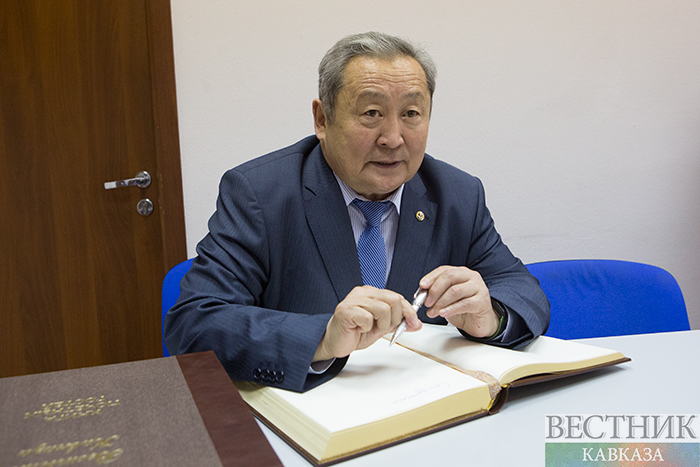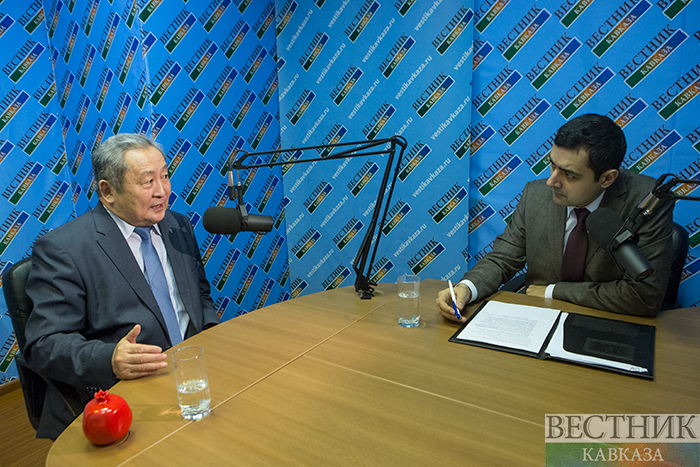Tribune’s guest is a member of the Federation Council Committee on International Affairs, the senator from Buryatia, Honored Worker of Science, Doctor of Geographical Sciences, professor, corresponding member of the Russian Academy of Sciences, the author of over 300 scientific works, Arnold Tulokhonov.
- Now people speak a lot about the resumption of the socio-cultural and economic ties with the countries of the former Soviet Union. Could you tell us what steps are being taken in this direction by the Committee on Foreign Affairs has?
- Our country has 14 border neighbors, together with China. These are two very ''neighboring'' countries with other territories. We are the only country in the world which is adjacent to four confessions – Christianity, Orthodoxy, Buddhism. We need to implement a diversification policy on our borders. Our borders have three objects that are of particular interest in terms of geography. The 7000-km-border with Kazakhstan. The 4000-km-border with China. The 3000-km border with Mongolia. But we cannot help paying attention to this situation. So I try to persuade my Committee and the Federation Council in order to solve problems of optimum development and cooperation with these entities. And in general, when we say that we have a very difficult situation in the West, Russia is starting cooperation with the Eastern countries. I have been speaking about this for 10-15 years. on their borders or markets, the Asia-Pacific region, China and Vietnam are very important regions for us, as they have very intensively developing economies. My job is to maintain and develop these relations. I recently put forward such an idea about the formation of an Association of Parliaments of Northeastern Asia. Because southeast Asia is Siam, but there is no northeast Asia, though there are the Association of Cities and the Association of Women. Northeast Asia is Russia, Mongolia, China, Kazakhstan, Japan and the two Koreas. Why don't we, parliamentarians, distance ourselves from politics, speaking about people, about friendship? But we don't create such an organization. Today the Americans are creating the Asia-Pacific Partnership, which is without Russia and China, but with Vietnam. And we must always preach the idea of cooperation, develop mutually beneficial conditions for us and, of course, for our partners. So my view is the development of cross-border cooperation. It is not only cooperation between Beijing and Moscow, or Ulan Bator and Moscow. Cross-border cooperation should be developed among regions, entities and even municipalities.
- Russia and Kazakhstan have the longest land border in the world. Inter-regional forums take place on an annual basis – in Russia and in the border regions of Kazakhstan year after year. Maybe we should think about some similar forums with other countries?
- This is an organizational part. Here is a concrete example. There is the city of Heihe on the Chinese side of the Amur River, and the city of Blagoveshchensk on the Russian side. I recently I saw an interesting thing on TV. The Chinese filmed in Heihe. They couldn't find the old Chinese Fanza and started to construct scenery. But such old wooden huts were on our side, too – in Blagoveshchensk, Zabaikalsk.
Why is this part of our country developing? With the help of our forests, exports, as well as from tourist trips at the expense of money of our citizens. And why? Because the Chinese side solves problems of entities automatically at the level of municipalities. But we must harmonize the sale of each log with Moscow. Under such conditions we will never become a rich country because of the bureaucracy, temporary prolongations and so on. So I'm trying to carry out this work today. I have been implementing the law "On cross-border cooperation'' for more than 10 years. But, unfortunately, our first version was dismissed by Moscow because of separatism. It is not separatism, I just want to trade and develop the economy of my region. I haven't see the last variant, which is to be submitted by the government. But I will strongly protest if the centralization of trade is made the basis for solving the border problems.

- Could you tell me what your attitude is towards the migration processes that are taking place in the region in the framework of the Eurasian Economic Union?
- The SCO, BRICS, CSTO and the Eurasian Economic Union are very important for Russia, especially against the background of the political trends that are taking place in the West now. In my opinion, there is no scientific justification. So I watched the composition of 17 committees of the EAEC. There is no Committee for Science there. How can these problems be solved without the Committee for Science? Although this is probably the formal side. There is no Committee on Environmental Issues, but we have a lot of problems – the Irtysh, the Amur. They are transboundary rivers that come from China. You can see the problem with the Irtysh and the Amur, because the headwaters are located in China, and China doesn't hesitate in its propriety and drains the water resources of the rivers, using them for other purposes. This requires scientific justification. There is the problem of desertification. In the Great Steppe, which spans from the Carpathians to the Khingan, there is a common problem of desertification. We must solve these problems together. Discussing these issues, I speak about the necessity of a scientific background, the rationale for the problem, the solution of environmental problems. Today at the summit we signed the declaration of the greenhouse effect in Paris. It is a significant sum of money and a huge problem in terms of the economy. Then we then signed a pledge to cut emissions. And where do the emissions go? They have to be assimilated. This is also a very important thing.
- Arnold Kirillovich, we are in the Vestnik Kavkaza studio. You represent Buryatia. Tell me, what can unite such a region as the Caucasus, and such a republic as Buryatia?
- In November, on the Day of the Police, our delegation, consisting of members of the Federation Council and the State Duma and the Minister of Internal Affairs of Buryatia, visited places of deployment of our unit on combating terrorism in Dagestan, and expressed to them our gratitude, gave gifts, met with the leadership of the republic, which had enormous impact on ourselves, on our Interior Ministry officers. This is a direct contact, a direct instance of a solution of one small problem.
The second point is that not so long ago, I wrote an information note to the leadership of the Federation Council that we don't have an entirely correct information policy in the field of interethnic cooperation, interethnic relations, when we say that everything is bad, we have problems everywhere, let's talk about the good. And in history we had many more of these problems. In 1966 I enrolled into the University of Irkutsk, it held Estonian Days – for the first time I saw the orchestra of Gustav Ernesaks, for the first time I saw how Georg Ots sings, for the first time I saw Paul Keres playing chess on the streets of Irkutsk. It was like a direct, immediate example of friendship between the peoples.
A small anniversary is going to be celebrated on the Baikal-Amur Mainline, and in this regard it would be great to erect a bust, a monument to Heydar Aliyev at Ango station. Because almost all of the union republics built or were chiefs of stations along the route of the Baikal-Amur Mainline. Niya was built by Georgians, Ango was built in Buryatia by Azerbaijanis. We perfectly remember how, in 1983, Heydar Aliyev, in the rank of First Deputy Prime Minister of the government, came to the Baikal-Amur Mainline, and supervised this construction, helping us in solving many, many issues. Therefore, as a sign of memory of the fact that now it is thirty-five years since the arrival of the first train to Ango station, we will invite, or rather, firstly we will erect a bust, then invite the family of Heydar Aliyev to this, invite the Azerbaijani Diaspora, and thus once again create a bond between the Caucasus and Buryatia, Baikal and the other peoples who live and work on the Baikal-Amur Mainline.

- We have a traditional rubric, 'From Kamchatka Territory to the Kaliningrad Region', it is dedicated to import substitution in the field of tourism. Buryatia is a very beautiful region with very interesting geography. Maybe you can tell us a few words about it?
- I really dislike, when people in tourism say "unique" – each of our places are unique, they never repeat. That is why we will drop this epithet, and talk about what will be interesting. First of all, there is, of course, a crossroads of cultures and religions of East-West, Buddhism-Christianity. It precisely occurs in Buryatia and along Baikal, this is not a border, but a crossroads, because there is no border here, but precisely a junction zone of these cultures. Next, there is a center of the Buddhist religion. In the Buddhist religion, especially today we should often repeat, there is a policy of non-violence. Let's remember Mahatma Gandhi, who always said: do not use violence, do not use force. Only through friendship, repentance and understanding of cultures can we solve all of our problems.
There is, in some way, the most eastern point, zone, boundary, well, border, if you wish, which became the border of the Russian East. The Aigunsky treaty, the Kyakhtinsky treaty, the Nerchinsky treaty, which formed the modern position of our relations with China, were all signed here. Great ambassadors were here: Fedor Golovin, Nikolay Spafary, Sava Raguzinsky-Vladislavich. We must remember that these ambassadors, in many ways, made our country so large in the East.
We are talking about great geographical expeditions: of Potanin, of Przewalski, of Kozlov. Those, after all, were military intelligence officers, who extended the border, the zone of influence of Russia in the East, and, at the same time, they explored nature and gave us unique information about how Baikal looked a hundred years ago, what kinds of people, traditions and customs were there. All of this is our culture, and we should speak about it more often, because without history there is no understanding of the future.






